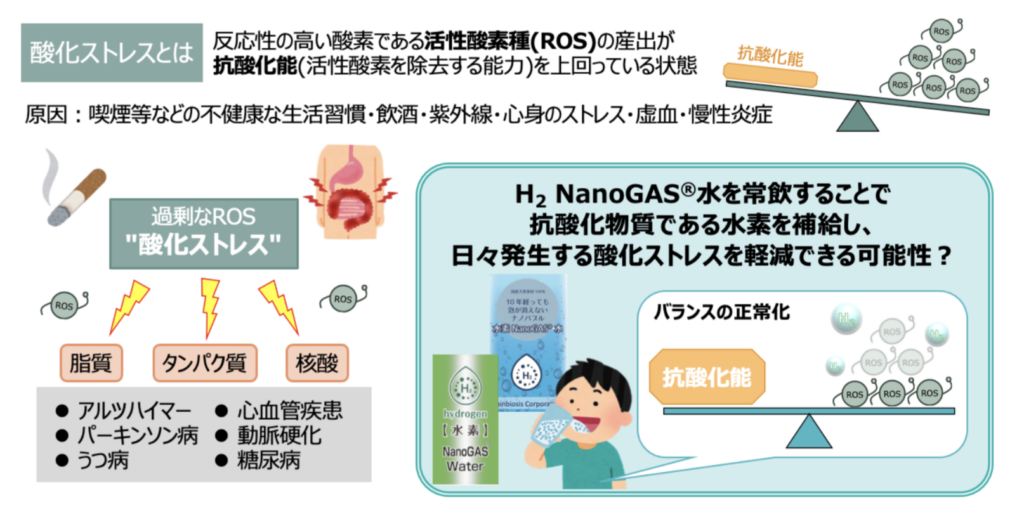Test Results: Alleviation Effect of Alcohol-Induced Oxidative Stress by Drinking Hydrogen NanoGAS Water
Oct. 01, 2024
1. What are the effects of hydrogen?
Highly reactive oxygen species, called Reactive oxygen species (ROS), are produced daily within our bodies. This ROSplays an important role in immunity (host defense) and as a signaling molecule. ROS that is excessively produced beyond its role is removed by antioxidants (antioxidant defense mechanisms) equipped in the body. However, when the balance between the production and removal of this ROS is disrupted due to poor lifestyle habits, mental and physical stress, drinking, smoking, chronic inflammation, or other factors, the excessive ROS damages normal cells. This condition is called “oxidative stress.” Oxidative stress is known to cause various Diseases by damaging important components that make up our bodies (proteins, lipids, nucleic acids, etc.).

To address this oxidative stress, consuming antioxidants is useful for balancing the production and removal of ROS, in addition to regulating lifestyle habits. The daily consumption of appropriate amounts of vegetables and fruits containing antioxidants is recommended because it is necessary to incorporate these important components into the body. On the other hand, many antioxidant supplements are available as an easy medium for consumption, but the consumption of these has been shown to potentially be ineffective in the Prevention of Diseases (*1).
Hydrogen is a colorless, odorless, and tasteless gas that is the lightest and most diffusive. Hydrogen is an antioxidant and has a physiologically active effect of reducing the highly reactive oxygen species (ROS) mentioned above. Recent research has clarified that hydrogen shows efficacy against oxidative stress not only through its direct reducing power but also by influencing complex oxidative stress response signal gene expression (*2).
An advantage of using hydrogen is that it is a component produced within our bodies (bacteria produce hydrogen gas in the gut), and because it is non-toxic, consuming an excess of hydrogen will not cause harm to the body.
.
2. The Difficulty of Incorporating Hydrogen into the Body
In section 1, we explained that hydrogen does not show toxicity to the living body, but because hydrogen gas is also flammable, consuming hydrogen as a gas in daily life is not very practical.
Furthermore, hydrogen is difficult to dissolve in water and is a molecule with such high permeability that it can pass through plastic containers. Consequently, even saturated hydrogen water, in which hydrogen is dissolved, will lose half its concentration in about 2 hours once opened (*3).
.
3.水素NanoGAS水の飲水による、酸化ストレス軽減効果(*4)
On the other hand, NanoGAS® (Nanobubbles), which are nano-sized fine bubbles, are known to stabilize in the liquid for long periods because they are not released from the liquid surface into the atmosphere due to buoyancy. (Click here for a detailed explanation of NanoGAS®)
Hydrogen NanoGAS® water is a product that allows hydrogen to be stored in the liquid for a long period by encapsulating hydrogen in NanoGAS®, making it completely different from ordinary hydrogen water where hydrogen is merely dissolved.
To verify the antioxidant effect of Hydrogen NanoGAS® water, we conducted various measurements on rats whose daily drinking water was switched to Hydrogen NanoGAS® water after inducing oxidative stress through alcohol consumption. The results showed that it suppressed the increase in blood lipid peroxidation levels, which rise due to oxidative stress, and an effect was observed that maintained and protected the activity of liver mitochondria, which are deeply related to alcohol metabolism and are susceptible to damage from drinking.
From this result, the possibility was shown that drinking Hydrogen NanoGAS® water may be effective in alleviating the oxidative stress that can occur daily.
(*1): https://www.ejim.ncgg.go.jp/public/overseas/c02/02.html
(*2): Ohta S. Molecular hydrogen as a preventive and therapeutic medical gas: initiation, development and potential of hydrogen medicine. Pharmacol Ther. 144 (2014) 1-11. https://doi.org/10.1016/j.pharmthera.2014.04.006 (※英語サイト)
(*3): https://molecularhydrogeninstitute.org/concentration-and-solubility-of-h2/
(*4): Morishita R, Onishi A, Oya M, Karashima H, Mori M, Kawatani Y, Kamei N, Takeda-Morishita M. Effect of Orally Ingested Water Containing H2-Filled Ultrafine Bubbles (UFBs) on Ethanol-Induced Oxidative Stress in Rats. Biol Pharm Bull. 47 (2024) 1106-1112. https://doi.org/10.1248/bpb.b24-00034 (※英語サイト)